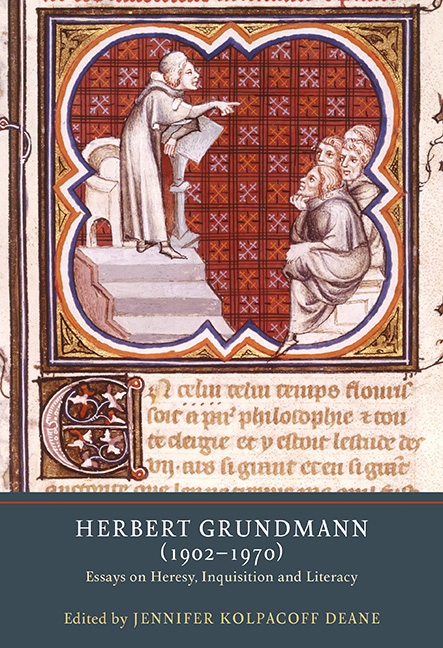Book contents
- Frontmatter
- Contents
- Acknowledgements
- Abbreviations
- Introduction
- Note on the Text
- 1 The Profile (Typus) of the Heretic in Medieval Perception
- 2 Women and Literature in the Middle Ages: A Contribution on the Origins of Vernacular Writing
- 3 Litteratus–Illitteratus: The Transformation of an Educational Standard from Antiquity to the Middle Ages
- 4 Heresy Interrogations in the Late Middle Ages as a Source-Critical Problem
- 5 Oportet et Haereses Esse: The Problem of Heresy in the Mirror of Medieval Biblical Exegesis
- 6 Learned and Popular Heresies of the Middle Ages
- 7 Obituary Essay (1970) by Arno Borst [annotations by Dr Letha Böhringer]
- 8 Bibliography of Herbert Grundmann
- Index
- YORK MEDIEVAL PRESS: PUBLICATIONS
3 - Litteratus–Illitteratus: The Transformation of an Educational Standard from Antiquity to the Middle Ages
Published online by Cambridge University Press: 19 March 2020
- Frontmatter
- Contents
- Acknowledgements
- Abbreviations
- Introduction
- Note on the Text
- 1 The Profile (Typus) of the Heretic in Medieval Perception
- 2 Women and Literature in the Middle Ages: A Contribution on the Origins of Vernacular Writing
- 3 Litteratus–Illitteratus: The Transformation of an Educational Standard from Antiquity to the Middle Ages
- 4 Heresy Interrogations in the Late Middle Ages as a Source-Critical Problem
- 5 Oportet et Haereses Esse: The Problem of Heresy in the Mirror of Medieval Biblical Exegesis
- 6 Learned and Popular Heresies of the Middle Ages
- 7 Obituary Essay (1970) by Arno Borst [annotations by Dr Letha Böhringer]
- 8 Bibliography of Herbert Grundmann
- Index
- YORK MEDIEVAL PRESS: PUBLICATIONS
Summary
Over the last hundred years, the word Literat has acquired a negative, almost noxious connotation in German usage. No one refers to himself this way, and no writer wants to be called a Literat – the word has nearly become an insult. Karl Gutzkow (1811–1878), for example, the programmatic leader of the ‘Young Germany’ movement, used it to disparage ‘abstract literacy’ in a review of Briefe aus Paris, in the Deutsche Jahrbuchern (V, 1196), ‘A dubious character, an actual Litterat who writes in order to write, not to help realise a single moral idea important to his life’, and again, ‘A true Litterat does not think of himself, but of his consumer’. Gutzkow later recalled the emerging usage of the word during his youth in Ruckblick auf mein Leben: ‘One called these people “Literaten” in contempt, who appeared to have embodied in themselves nothing but a writing pen.’ In German, this insulting quality hovers around the term, while the corresponding French word ‘lettre’ still bears positive connotations of the scholar, the studied person, the scientifically or literarily educated person (like letterato in Italian, also letrado in Spanish). Indeed, in the eighteenth century, homme de lettres was a highly regarded, coveted title of honour far beyond France, even in Germany. And in Georges's dictionary, the Latin adjective litteratus was rendered into German as ‘knowing literature, learned, academically educated’, words of praise without the disreputable connotation of Literaten. Evidently a recent shift in meaning correlates to a related change in the valuation and appreciation of writing, of letters, and to transformed attitudes toward and relationships with literature. Most surprising, however, is that, on closer observation, the phenomenon of shifting meanings of litteratus may be traced even further back; it is in fact characteristic of the early centuries after antiquity and thus highly revealing for educational and intellectual history.
Although the counter-concept of illitteratus was common in classical and medieval Latin alike – defined according to Georges as ‘unlearned, unknowing, not scientifically educated’, in French as illettre, in Italian as illetterato, preserved in Spanish as iletrado and iliterato – it never made its way into German, nor did the corresponding Greek word.
- Type
- Chapter
- Information
- Herbert Grundmann (1902–1970)Essays on Heresy, Inquisition, and Literacy, pp. 56 - 125Publisher: Boydell & BrewerPrint publication year: 2019



